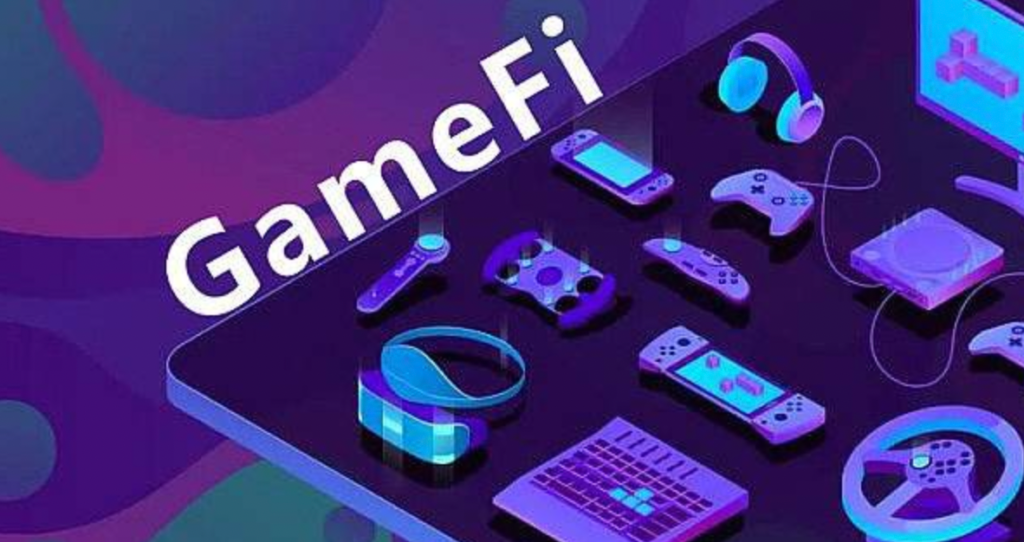A Beginner’s Guide To The Gamefi Ecosystem

GameFi, short for gaming finance, is a rapidly growing sector that combines elements of gaming and decentralized finance (DeFi). It encompasses a wide range of blockchain-based games that offer players economic incentives to participate, typically through play-to-earn models. In these models, players can earn cryptocurrency tokens or non-fungible tokens (NFTs) by completing tasks, battling other players, or progressing through the game levels. These tokens can then be traded on crypto exchanges or used to purchase in-game items or services.
Key characteristics of GameFi
- Play-to-earn model: Players can earn tangible rewards while playing the game.
- Blockchain technology: Games are built on blockchain technology, ensuring transparency and security.
- Decentralized ownership: Players have true ownership of their in-game assets.
- Tokenization: In-game items and currencies are represented as tokens that can be traded on exchanges.
Benefits of GameFi
- Increased engagement and user base: The play-to-earn model incentivizes players to engage with the game and attract new users.
- Creation of new economic opportunities: Players can earn a real income by playing games.
- Empowerment of gamers: Players have more control over their in-game assets and can participate in game governance.
- Integration of gaming and DeFi: GameFi bridges the gap between the gaming and DeFi worlds.
Challenges of GameFi
- Sustainability of play-to-earn models: Ensuring the long-term sustainability of play-to-earn models is crucial to the success of GameFi.
- Scalability of blockchain technology: Blockchain technology needs to scale to handle the increasing demand from GameFi applications.
- User education: Educating users about blockchain technology and DeFi is essential for wider adoption.
- Regulatory uncertainty: The regulatory landscape surrounding GameFi and cryptocurrency is still evolving.
Future of GameFi
GameFi is still in its early stages of development, but it has the potential to revolutionize the gaming industry. As the technology continues to evolve and more users adopt blockchain technology, GameFi is poised to become a major force in the gaming landscape.
GameFi Stakeholders
The GameFi ecosystem is made up of a variety of stakeholders, each with their own interests and goals. These stakeholders can be broadly categorized into four groups:
Players: Players are the core users of GameFi platforms and are the primary drivers of value creation. They are incentivized to play games by the opportunity to earn rewards in the form of cryptocurrencies or NFTs.
Developers: Developers create the games and platforms that power the GameFi ecosystem. They are responsible for designing the game mechanics, building the infrastructure, and implementing the tokenomics.
Investors: Investors provide the capital that is needed to develop and grow GameFi projects. They are looking for opportunities to invest in projects that have the potential to generate high returns.
Infrastructure providers: Infrastructure providers provide the underlying services that are needed to operate GameFi platforms. This includes things like blockchain networks, cryptocurrency wallets, and marketplaces.
In addition to these four primary groups, there are a number of other stakeholders that play a role in the GameFi ecosystem. These include:
Marketers: Marketers help to promote GameFi projects and reach potential players and investors.
Influencers: Influencers use their social media platforms to promote GameFi projects and influence their followers.
Regulators: Regulators are responsible for overseeing the GameFi industry and ensuring that it is compliant with applicable laws and regulations.
The interests of the different stakeholders in the GameFi ecosystem are not always aligned. For example, players may be interested in maximizing their earnings, while developers may be more focused on creating a fun and engaging experience. Investors may be looking for short-term returns, while infrastructure providers may be focused on building long-term value.
Despite these differences in interests, there is a common goal that unites all stakeholders in the GameFi ecosystem: to create a thriving and sustainable ecosystem that benefits everyone involved. This can be achieved by working together to develop innovative projects that attract a wide range of users and investors.
Here is a table that summarizes the different stakeholders in the GameFi ecosystem and their interests:
Game studios
Video game studios are businesses that create and develop video games. They are responsible for all aspects of game development, from concept to completion. This includes designing the gameplay, creating the graphics and sound, and writing the code.
Video game studios vary in size from small independent teams to large multinational corporations. Some studios focus on developing games for a specific platform, such as consoles or mobile devices, while others develop games for a variety of platforms.
Here are some of the most well-known video game studios in the world:
Nintendo is a Japanese video game company that is best known for its popular consoles, such as the Super Nintendo Entertainment System and the Nintendo Switch. The company also develops and publishes games for its consoles, including some of the most popular franchises in the world, such as Mario, Zelda, and Pokemon.
Ubisoft is a French video game company that is best known for its open-world games, such as Assassin’s Creed and Far Cry. The company also develops and publishes games for a variety of other genres, including racing, sports, and shooters.
Electronic Arts (EA) is an American video game company that is one of the largest publishers in the world. The company is known for its sports games, such as Madden NFL and FIFA, as well as its action-adventure games, such as Battlefield and Mass Effect.
2K is an American video game publisher that is best known for its sports games, such as NBA 2K and WWE 2K. The company also publishes games for other genres, including racing, strategy, and role-playing games.
Microsoft is an American technology company that is best known for its software products, such as Microsoft Windows and Office. The company also has a video game division, Xbox Game Studios, which develops and publishes games for the Xbox console. Some of the most popular franchises published by Xbox Game Studios include Halo, Gears of War, and Forza.
Sony Interactive Entertainment is a Japanese video game company that is best known for its PlayStation consoles. The company also develops and publishes games for the PlayStation, including some of the most popular franchises in the world, such as Uncharted, God of War, and Gran Turismo.
These are just a few of the many video game studios that exist around the world. The video game industry is a dynamic and ever-changing field, and new studios are constantly being created.
Metaverse
The metaverse is a hypothetical iteration of the Internet, as a single, universal and immersive virtual world that is facilitated by the use of virtual reality (VR) and augmented reality (AR) headsets.
In colloquial usage, a metaverse is a network of 3D virtual worlds focused on social connection. In scientific research, it is defined as “a three-dimensional online environment in which users represented by avatars interact with each other in virtual spaces decoupled from the real physical world”.
The term metaverse originated in the 1992 science fiction novel Snow Crash as a portmanteau of “meta” and “universe”. Metaverse development is often linked to advancing virtual reality technology due to the increasing demands for immersion. Recent interest in metaverse development is influenced by Web3, a concept for a decentralized iteration of the internet.
The metaverse is still in its early stages of development, but it has the potential to revolutionize the way we interact with the internet. It could be used for a variety of purposes, including:
- Social interaction: The metaverse could be used to create virtual spaces where people can meet and interact with each other, even if they are not in the same physical location.
- Education: The metaverse could be used to create immersive learning experiences that allow students to explore different worlds and interact with historical figures.
- Gaming: The metaverse could be used to create new and innovative gaming experiences that take advantage of virtual reality and augmented reality.
- Business: The metaverse could be used to create virtual offices and other spaces where businesses can collaborate and interact with customers.
The metaverse is a complex and ambitious project, but it also has the potential to be incredibly transformative. As the technology continues to develop, we can expect to see even more innovative and creative applications for the metaverse in the years to come.
Gaming Guilds
A gaming guild is a community of players who come together to play games, share strategies, and socialize. They can be found in all genres of gaming, from casual mobile games to hardcore MMOs. Gaming guilds offer a number of benefits to their members, including:
- A sense of community and belonging: Gaming guilds can provide a place for players to connect with others who share their interests. This can be especially important for players who may feel isolated or alone in their everyday lives.
- Access to resources and information: Gaming guilds often have access to resources and information that can help their members improve their gameplay. This can include access to experienced players, guides, and other resources.
- Opportunities to compete and collaborate: Gaming guilds often participate in competitions and other events. This can give their members a chance to test their skills against other players and work together towards common goals.
In the world of blockchain gaming, guilds have taken on a new role, providing players with access to the necessary assets and resources to participate in play-to-earn games. These guilds typically invest in non-fungible tokens (NFTs) and other in-game assets, which they then lend to players who may not otherwise be able to afford them. In return, the guild takes a share of the player’s earnings. This model has been particularly successful in countries like the Philippines, where many people are struggling to make ends meet.
Here are some of the top crypto gaming guilds operating today:
- Yield Guild Games (YGG): YGG is one of the largest and most well-known crypto gaming guilds. It has a wide portfolio of investments in blockchain games and NFTs, and it provides scholarships to players around the world.
- Merit Circle: Merit Circle is another major player in the crypto gaming space. It is known for its strong focus on governance and community engagement.
- GuildFi: GuildFi is a decentralized autonomous organization (DAO) that aims to bring more transparency and efficiency to the crypto gaming guild ecosystem.
- PathDAO: PathDAO is a guild that is focused on supporting the development of new blockchain games.
- Good Games Guild: Good Games Guild is a guild that is focused on growing the blockchain gaming community in Southeast Asia.
These are just a few of the many crypto gaming guilds that are operating today. As the blockchain gaming space continues to grow, we can expect to see even more guilds emerge in the years to come.
I hope this information is helpful. Please let me know if you have any other questions.
NFT renting platforms
NFT renting platforms are online marketplaces that allow users to rent and borrow NFTs. These platforms provide a way for NFT owners to generate income from their assets without having to sell them, and for NFT enthusiasts to access and experience NFTs without having to purchase them outright.
Benefits of NFT renting platforms:
Increased accessibility: NFT rental platforms make NFTs more accessible to a wider audience by allowing users to experience them without having to invest large sums of money.
Enhanced utility: NFTs can gain additional utility through rental platforms, as they can now be used for various purposes beyond just collecting or trading.
Alternative revenue stream: NFT owners can generate passive income by renting out their NFTs on these platforms.
Popular NFT renting platforms:
ReNFT: A multichain NFT rental protocol that supports both collateralized and non-collateralized renting.
IQ Protocol: A decentralized money market for digital-asset renting, including NFTs.
UNITBOX DAO: An NFT rental protocol based on a revenue-sharing model.
Vera: A multichain DeFi protocol for NFT rentals and mortgages.
Double Protocol: An NFT rental protocol and marketplace that developed the ERC-4907 standard for NFT renting.
Considerations when using NFT renting platforms:
Platform reputation: Choose a reputable platform with a proven track record and a strong community.
NFT selection: Carefully evaluate the NFTs available for rent, considering their value, utility, and potential risks.
Rental terms: Understand the rental terms, including the rental duration, fees, and insurance options.
Security: Ensure that the platform implements robust security measures to protect your NFTs and funds.
NFT renting is an emerging field with the potential to revolutionize the way NFTs are used and experienced. As the technology continues to develop, we can expect to see even more innovative NFT rental platforms and use cases emerge.
Gaming marketplace
Gaming marketplaces are online platforms where gamers can buy, sell, and trade video games, in-game items, and other gaming-related content. They have become increasingly popular in recent years as the gaming industry has grown and more gamers are looking for ways to save money or get their hands on rare or exclusive items.
Some of the most popular gaming marketplaces include:
- G2A: G2A is one of the largest gaming marketplaces in the world, with over 20 million customers. It offers a wide variety of games, in-game items, and other gaming-related content at competitive prices.
- Kinguin: Kinguin is another popular gaming marketplace that offers a similar selection of games and in-game items as G2A. It is known for its low prices and its wide range of payment options.
- Eneba: Eneba is a newer gaming marketplace that has quickly gained popularity. It offers a similar selection of games and in-game items as G2A and Kinguin, but it also offers a wider range of features, such as a price tracker and a wishlist.
- GamersGate: GamersGate is a more established gaming marketplace that is known for its focus on quality and customer service. It offers a smaller selection of games than some of the other marketplaces, but its games are all DRM-free.
- Instant Gaming: Instant Gaming is a French gaming marketplace that is known for its low prices. It offers a wide variety of games, including many that are not available on other marketplaces.
Game launchpads
A game launchpad, also known as an Initial Game Offering (IGO) platform, is a decentralized or centralized platform that helps gaming projects raise capital and distribute their tokens or in-game assets to early investors. They act as a bridge between promising gaming projects and potential investors, providing a secure and efficient way for both parties to participate in the growing GameFi ecosystem.
Benefits of Game Launchpads
Game launchpads offer several benefits to both gaming projects and investors:
For Gaming Projects:
- Access to funding: Launchpads provide a platform for gaming projects to raise capital from a large pool of potential investors.
- Community building: Launchpads can help projects connect with and build a community of early supporters.
- Marketing and exposure: Launchpads can help projects generate buzz and awareness for their games.
For Investors:
- Early access to promising gaming projects: Investors can participate in IGOs to gain early access to promising gaming projects before they are publicly available.
- Potential for high returns: GameFi projects have the potential to generate significant returns for investors.
- Diversification: GameFi investments can diversify an investor’s portfolio.
How Game Launchpads Work
The process of launching a game on a launchpad typically involves the following steps:
- Project application: The gaming project submits an application to the launchpad.
- Project vetting: The launchpad reviews the project’s application and decides whether to list it on the platform.
- Token sale: If approved, the project conducts a token sale on the launchpad.
- Token distribution: Once the token sale is complete, the tokens are distributed to investors.
Popular Game Launchpads
Some of the most popular game launchpads include:
- Seedify
- GamesPad
- Enjin Starter
- Gamestarter
- UniX Game
Game Launchpads and the Future of Gaming
Game launchpads are playing an increasingly important role in the development and growth of the GameFi industry. By providing a platform for promising gaming projects to raise capital and gain exposure, launchpads are helping to drive innovation and adoption in the space. As the GameFi industry continues to grow, game launchpads are likely to play an even more important role in the future of gaming.
Future of GameFi
The future of GameFi looks bright, with the potential to revolutionize the gaming industry by introducing new levels of ownership, engagement, and monetization. Here are some of the key trends that are shaping the future of GameFi:
1. Enhanced Gameplay and Immersive Experiences: GameFi developers are increasingly focusing on creating high-quality games with engaging gameplay, immersive environments, and compelling storylines. This is crucial to attract and retain a wider audience of gamers, not just those motivated solely by financial incentives.
2. Innovative Play-to-Earn Models: The traditional play-to-earn (P2E) model, which rewards players for their time and effort, is evolving to become more sustainable and engaging. Developers are experimenting with new models that balance earning potential with fun and challenging gameplay.
3. Interoperable and Customizable GameFi Ecosystems: GameFi projects are becoming more interoperable, allowing players to seamlessly transfer assets and data between different games and platforms. This is fostering the development of more diverse and interconnected GameFi ecosystems.
4. Integration of Non-Fungible Tokens (NFTs): NFTs are playing an increasingly important role in GameFi, providing players with true ownership of their in-game assets and enabling new forms of monetization. NFTs can represent items, characters, land, or even entire game worlds.
5. Expansion beyond Traditional Gaming Genres: GameFi is expanding beyond traditional gaming genres to include new and innovative experiences, such as social games, virtual worlds, and casual mobile games. This is attracting a broader audience and increasing the appeal of GameFi.
6. Decentralized Governance and Community-Driven Development: GameFi projects are increasingly adopting decentralized governance models, allowing players to participate in decision-making processes and shape the future of the game. This is fostering a more engaged and empowered gaming community.
7. Integration with Web3 and Metaverse Technologies: GameFi is becoming an integral part of the emerging Web3 and metaverse landscape, providing a foundation for truly immersive and decentralized gaming experiences. This convergence is opening up new possibilities for GameFi’s future.
While GameFi still faces challenges, such as ensuring long-term sustainability, addressing regulatory concerns, and improving user onboarding, the overall outlook for the industry is positive. GameFi has the potential to transform the gaming landscape by empowering players, fostering innovation, and creating new economic opportunities.
In Conclusion:
GameFi represents a promising evolution in the gaming industry. Its integration of blockchain technology and decentralized finance has the potential to revolutionize the way games are played, monetized, and experienced. As more developers and players embrace GameFi, we can expect to see a shift towards more immersive and inclusive gaming experiences. However, it is important to acknowledge the challenges that lie ahead. GameFi must navigate regulatory hurdles, ensure sustainable growth, and enhance user onboarding processes to truly realize its potential.







